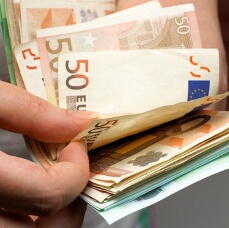It was another poor trading week for the euro, which fell for the 12th straight week and reached a new multi-year low against the US dollar. While the European Central Bank policy announcement provided moderate support for the shared 18-nation currency, employment data from the United States did not allow the euro to hold onto gains.
The European Central Bank stayed put, preferring not to ease its monetary policy further. This decision led to a rally of the euro against other majors. Yet the rally was short-lived as better-than-expected non-farm payrolls drove the common eurozone currency down to new lows versus the dollar.
While the euro ended the week soft, the weakest currency was the Great Britain pound. Poor economic indicators suggested that the Bank of England will not be able to raise interest rates as soon as was expected, reducing the appeal of the sterling.
EUR/USD dropped from 1.2682 to 1.2511 (1.4 percent) to the weakest weekly close since August 2012. EUR/JPY declined from 138.60 to 137.36. At the same time, EUR/GBP advanced from 0.7809 to 0.7832, bouncing from the weekly low of 0.7766 — the lowest level since July 22.
If you have any questions, comments or opinions regarding the Euro,
feel free to post them using the commentary form below.
